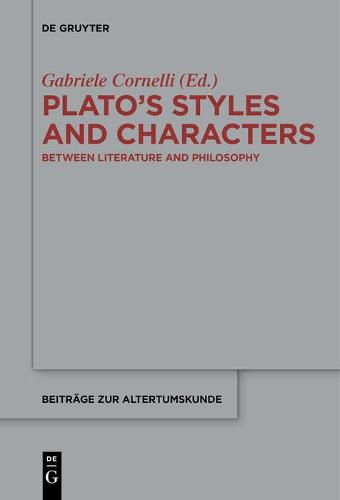Readings Newsletter
Become a Readings Member to make your shopping experience even easier.
Sign in or sign up for free!
You’re not far away from qualifying for FREE standard shipping within Australia
You’ve qualified for FREE standard shipping within Australia
The cart is loading…






This title is printed to order. This book may have been self-published. If so, we cannot guarantee the quality of the content. In the main most books will have gone through the editing process however some may not. We therefore suggest that you be aware of this before ordering this book. If in doubt check either the author or publisher’s details as we are unable to accept any returns unless they are faulty. Please contact us if you have any questions.
The significance of Plato’s literary style to the content of his ideas is perhaps one of the central problems in the study of Plato and Ancient Philosophy as a whole. As Samuel Scolnicov points out in this collection, many other philosophers have employed literary techniques to express their ideas, just as many literary authors have exemplified philosophical ideas in their narratives, but for no other philosopher does the mode of expression play such a vital role in their thought as it does for Plato. And yet, even after two thousand years there is still no consensus about why Plato expresses his ideas in this distinctive style.
Selected from the first Latin American Area meeting of the International Plato Society (www.platosociety.org) in Brazil in 2012, the following collection of essays presents some of the most recent scholarship from around the world on the wide range of issues related to Plato’s dialogue form. The essays can be divided into three categories. The first addresses general questions concerning Plato’s literary style. The second concerns the relation of his style to other genres and traditions in Ancient Greece. And the third examines Plato’s characters and his purpose in using them.
$9.00 standard shipping within Australia
FREE standard shipping within Australia for orders over $100.00
Express & International shipping calculated at checkout
This title is printed to order. This book may have been self-published. If so, we cannot guarantee the quality of the content. In the main most books will have gone through the editing process however some may not. We therefore suggest that you be aware of this before ordering this book. If in doubt check either the author or publisher’s details as we are unable to accept any returns unless they are faulty. Please contact us if you have any questions.
The significance of Plato’s literary style to the content of his ideas is perhaps one of the central problems in the study of Plato and Ancient Philosophy as a whole. As Samuel Scolnicov points out in this collection, many other philosophers have employed literary techniques to express their ideas, just as many literary authors have exemplified philosophical ideas in their narratives, but for no other philosopher does the mode of expression play such a vital role in their thought as it does for Plato. And yet, even after two thousand years there is still no consensus about why Plato expresses his ideas in this distinctive style.
Selected from the first Latin American Area meeting of the International Plato Society (www.platosociety.org) in Brazil in 2012, the following collection of essays presents some of the most recent scholarship from around the world on the wide range of issues related to Plato’s dialogue form. The essays can be divided into three categories. The first addresses general questions concerning Plato’s literary style. The second concerns the relation of his style to other genres and traditions in Ancient Greece. And the third examines Plato’s characters and his purpose in using them.